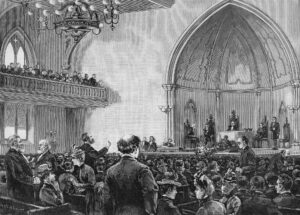A five-judge majority of the Supreme Court agreed that provincial law societies were right to deny accreditation to Trinity Western University’s proposed law school.
In its decisions released today (British Columbia decision here, Ontario decision here), the majority held that the law societies struck the right balance between pursuing equitable access to the legal profession and religious freedom.
TWU asks all community members to adhere to the mandatory Community Covenant which is reflective of Evangelical Christian beliefs. The requirement that students abstain from sexual intimacy that violates the sacredness of marriage between a man and a woman was characterized as creating an inequitable barrier to legal education and therefore to membership in the legal profession.
How did the majority come to that conclusion? The majority found that (1) Law Societies have a duty to act in the public interest and part of that duty includes promoting equality, ensuring equal access to the legal profession, supporting diversity within the bar, and preventing harm to LGBTQ law students; (2) religious freedom was only minimally impacted; (3) the benefits of achieving the law societies’ objectives outweighed the minor impact on religious freedom.
Acting in the Public Interest
Approving or facilitating such inequitable barriers to the profession had the potential to “undermine public confidence in the law societies’ ability to self-regulate in the public interest.” Further, “limiting access to membership in the profession on the basis of personal characteristics as opposed to merit, is inherently inimical to the integrity of the legal profession.”
Religious Freedom
What about religious freedom? The majority found that it was violated, but minimally so:
…
The objective of Equal Access & Diversity in Legal Profession
To approve TWU’s law school may undermine public confidence in the administration of justice if the law societies are “seen to approve a law school that effectively bars many LGBTQ people from attending.” It prevents the “risk of significant harm to LGBTQ people who attend TWU’s proposed law school,” as they “may suffer harm to their dignity and self-worth, confidence and self-esteem.”
The majority held that more is at stake in this case than disagreement and discomfort with views that some find offensive: “being required by someone else’s religious beliefs to behave contrary to one’s sexual identity is degrading and disrespectful. Being required to do so offends the public perception that freedom of religion includes freedom from religion.”
The refusal to approve TWU proposed law school “prevents concrete, not abstract, harms to LGBTQ people and to the public in general”.
Former Chief Justice McLachlin wrote a separate concurring decision and Justice Rowe concurred in the result but wrote a separate decision. Justices Browne and Cote wrote a strong dissent, noting the decision not to approve TWU’s proposed law faculty because of the Covenant “is a profound interference with religious freedom, and is contrary to the state’s duty of religious neutrality” and that “tolerance and accommodation of difference serve the public interest and foster pluralism.”
This is a major decision on religious freedom in Canada … more to come.
























